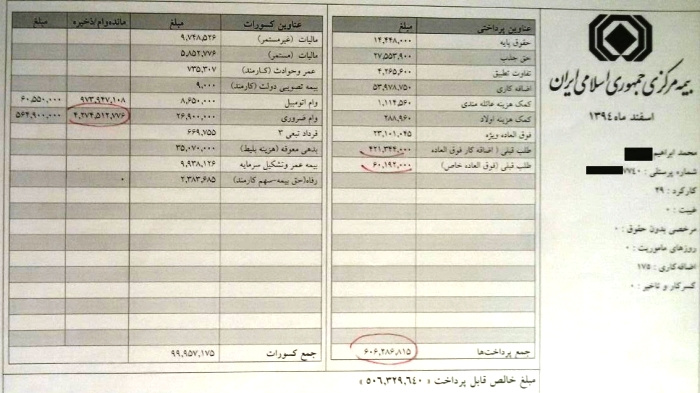Rouhani Administration to Punish Its Own Offspring over Pay Slip Scandal

Multi-million-toman pay slips of top executives at Bimeh Markazi (Central Insurance of Iran) hit online last month but the scandal was soon quenched when the CII director-general Mohammad-Ibrahim Amin resigned in a letter addressed to Finance Minister, Tayebnia. What seemed to be a transient whistleblower episode as a counter response to a similar case against the principlists has now curiously catapulted the administration into quick response audits, scrutinizing pay slips issued to its senior executives, as several others including that of the CEO of a private-sector bank have hit headlines. Ali Sedghi, of Refah Bank, has been paid 230 million toman (approximately 75 thousand US dollars) according to a pay slip that has gone viral on the Internet.
All the three branches of the government are involved to some extent and the scandalous episode is consuming every media outlet at a rapid rate that is too difficult to keep posted about. However, as officials are trying to block the enormous surplus pays in sharp contrast with minimum wages, the pay slips appear to also represent how slipshod the country’s heavily bureaucratic governmental economy and judicial regulations are.
The president issued a ruling addressed to vice president Eshagh Jahangiri urging immediate investigation and identification of all abuse and violation cases and the extradition of unfair payments to the national treasury. In his letter, Rouhani referred to figures paid in executive institutions under labels such as “bonuses or loans” that might be justifiable with regulations remained from previous terms but are inconsistent with justice, commitment to public property and the administration’s moral code. He further demanded Jahangiri to fire wrongdoers.
Vice president Jahangiri soon ordered cabinet members to report the average income of their senior executives including deputies, directors of subsidiary institutions, managing directors and members of boards of directors in companies, banks and other subsidiaries within a week. He also demanded the directors of the Supreme Audit Court and the General Inspection Office to send him any relevant lists.
Rumors have it that the attacks are aimed at eliminating a part of Rouhani’s economic squad. The main targets apparently include Ali Sedghi, ex-director of Sina Bank , Abdolnasser Hemmati, who has now substituted Mohammad-Ibrahim Amin in CII, Central Bank chief Valiollah Seif, former nuclear negotiator Sirous Nasseri who has allegedly fled the country over a half-million-dollar oil contract kickback, Rouhani’s Chief of Staff Mohammad Nahavandian and, last but not least, the president’s brother Hossein Fereidoun.
On Sunday, the administration’s spokesman Mohammad-Bagher Nobakht attended the special interview of a news program on state TV and officially apologized to people and his colleagues in a rare response attempted as show-stopper. Calling “even a single case of unfair salaries” unacceptable for an administration that wants to bring equality and welfare, he said legal permissions has enabled executive agencies to pay ‘unconventional’ bonuses.
Parliamentarian Gholmreza Tajgardoun, who represents Gachsaran and comes from an influential family, endorses the administration’s position that a misinterpretation of a directive first passed under the previous administration has led to the sitution. As Tajgardoun puts it, the directive was meant to bridge the wide gap between salaries in the private and public sectors that had caused a reluctance among professionals to work with the administration. The directive should have increased the executives’ salaries up to four or five million tomans, not ten times as much he said.
Iran’s judiciary officials have also started investigations into the issue. On Tuesday, Parliament Speaker Ali Larijani also gave tidings that the Supreme Audit Court’s report will soon be submitted to authorities. In yet another update, the SAC’s director also stated that the sanction that permitted such unconventional salaries was issued in the Persian calendar year 1392, an unclear piece of information as the year was almost equally divided between the last months of Ahmadinejad’s administration and first months of Rouhani’s.
Far from the madding crowd involved in the blame game, the administration is up to punish its own offspring that is getting tens of times more than laborers, some of whom are out of job and receive lashing verdicts after protest to company layoffs.

